Elderberry is a great plant! Not only can you use the flowers to make elderberry soda and elderberry sparkling wine, you can also bake the flowers in batter. Or wait a little longer and cook elderberry soup from the fruit, also called lilac berry soup in northern Germany. My grandmother always used to make it in the summer, with lots of love and lots of semolina dumplings.
Jump to recipeThis is what summer tastes like! Elderberry lemonade is a tangy, fermented midsummer drink.
At the latest around summer solstice, the elderberry blossoms. Even as you pass by, the large umbels entice you with their delicious smell. You can buy them rarely, it is best to pick them yourself. Far away from busy roads, the blossoms are certainly of better quality than on the highway. Many have elderberry bushes in their garden, just ask your neighbors. In return, you can give them a bottle of elderberry lemonade.
When picking wild flowers, please observe the traditional practices.
- Respect nature.
- Take only as much as you need.
- Always leave a few plants so they can reproduce.
- Animals also like blossoms, do not steal their feed in excess.
- Nature reserves are of course off limits.
- For collecting a basket is suitable, there the plants are not crushed.
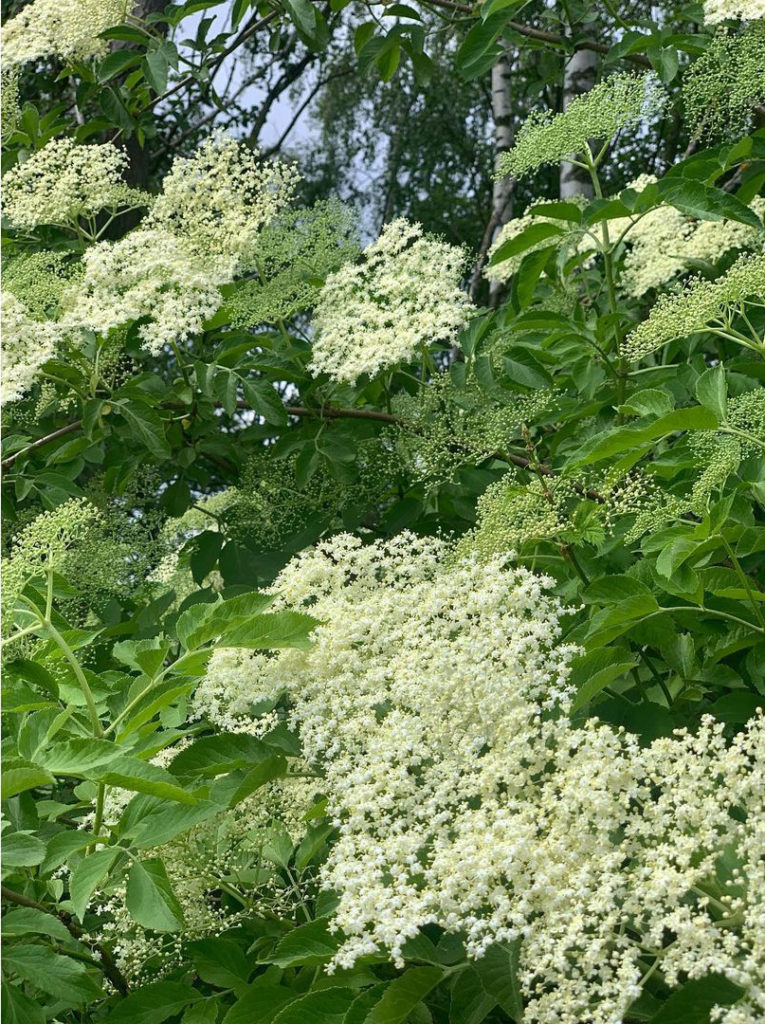
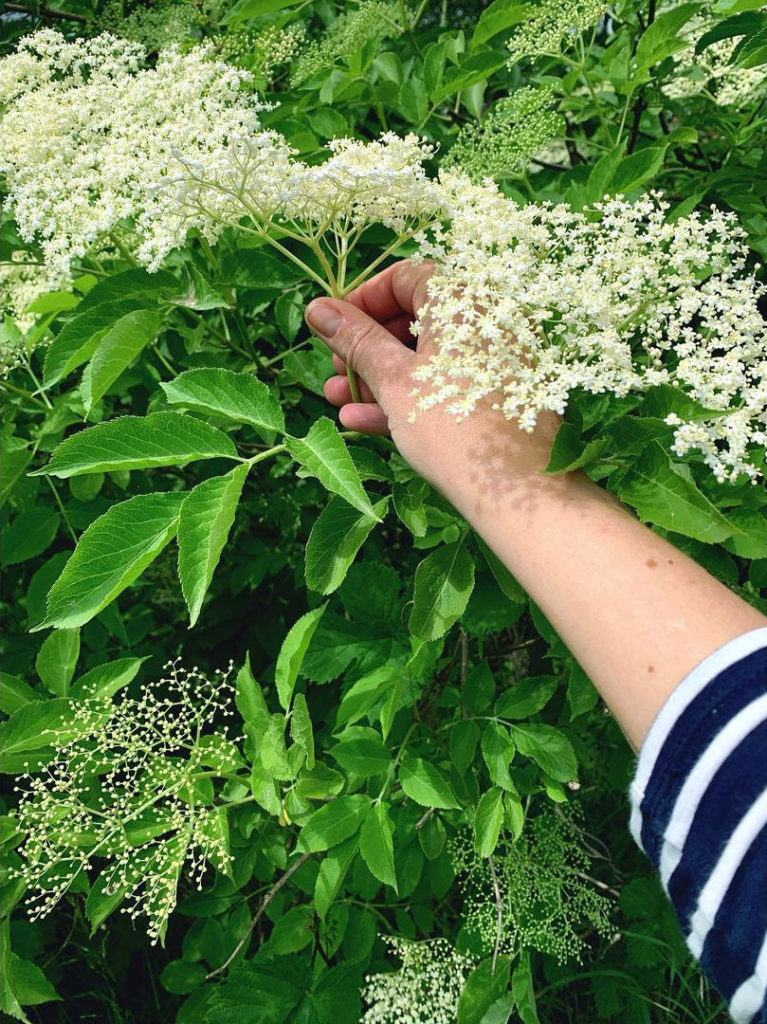
Once you've collected the blossoms, you can set about making your own elderberry soda or elderberry champagne.
This recipe makes 1.5 liters of beverage. Whether it becomes elderberry lemonade or elderberry sparkling wine depends on the fermentation time. But it will have at least 0.5% alcohol. That is as much as would still be permitted by law in Germany for non-alcoholic beer.
How to control the alcohol content of elderberry lemonade?
The natural yeasts on the flowers combined with the sugars are very powerful nutrition for alcoholic fermentation. To calculate the alcohol content, the basic formula is
C6H12O6 ➩ 2(CH3CH2OH) + 2(CO2) + energy
sugar (glucose) ➩ alcohol (ethanol) + carbon dioxide + energy
The type of yeast also regulates the maximum alcohol content. It is lower for brewer's yeast than for wine yeast. The wild yeast strains on the flowers are of course not controllable, so that fermentation by-products or final alcohol content are rather difficult to predict. In addition, fermentable sugars sit on the blossoms, the amount of which cannot be determined. In general, less sugar and a shorter fetmentation time produce less alcohol. So if you give the first fermentation only 24h of time and then give the lemonade only one more day to carbonate, you will usually have no more than about 1% alcohol in your drink.
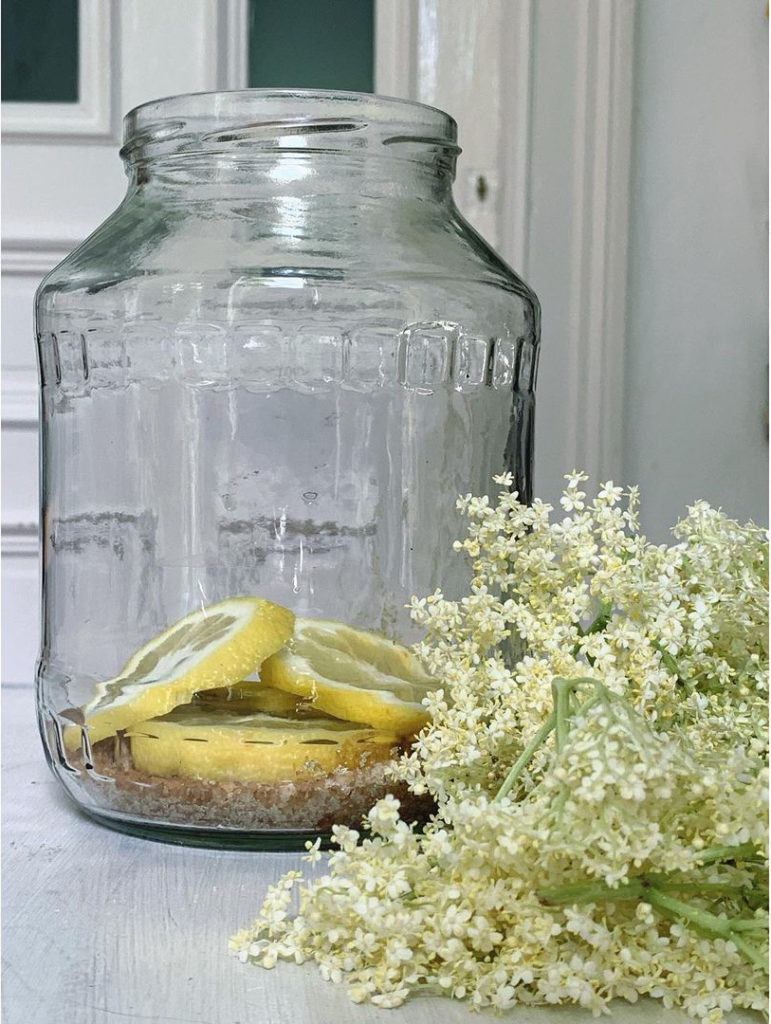
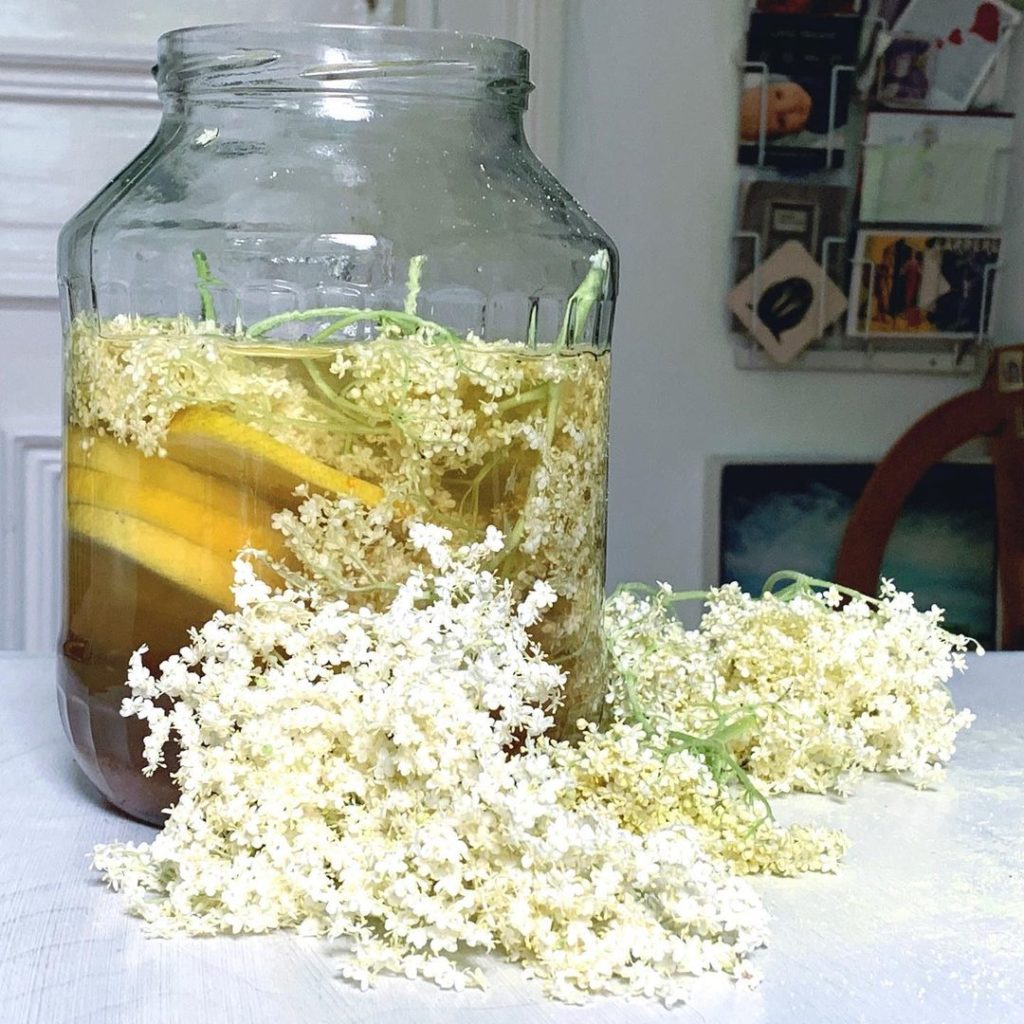
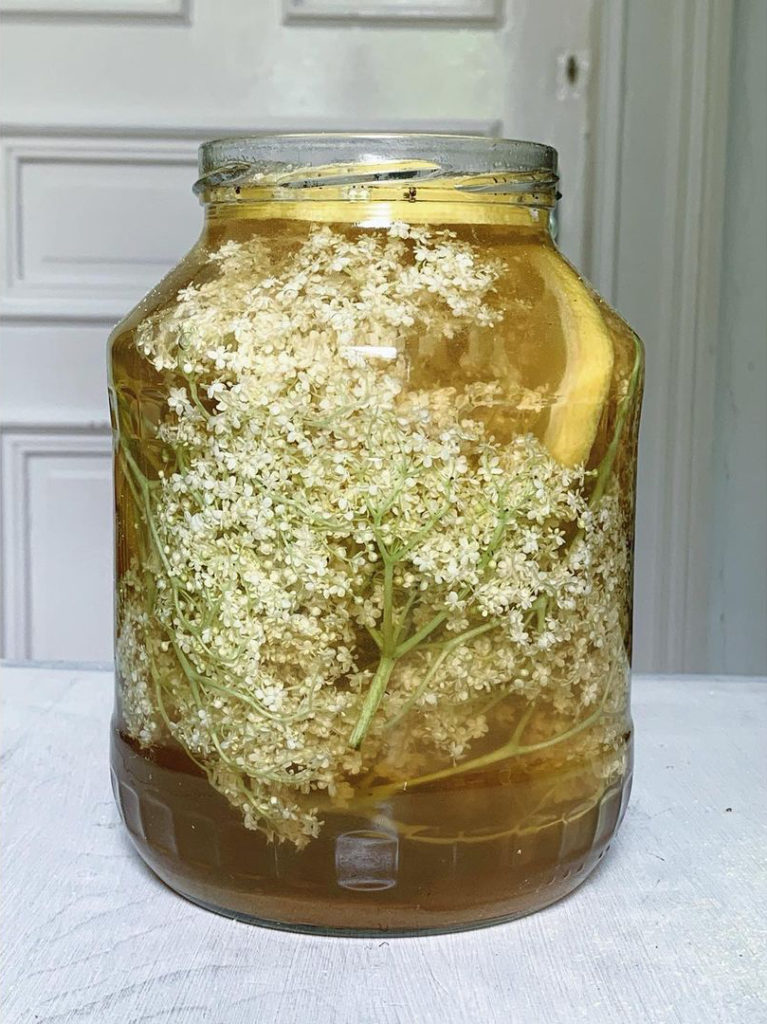
Elderberry soda
After a day, there is already plenty of carbonic acid, but only very little alcohol, so that the drink is now an elderberry soda. It is still quite sweet. Burp each bottle once, which means opening it slightly and releasing the pressure. Then store the bottles in a cool place, preferably away from light. I have a dedicated ferment refrigerator for this. If I didn't have that, I would put the bottles in the basement. Here, too, explosions can be made less dangerous by placing a cloth or cardboard box over the bottles.
Elderberry sparkling wine
While the sugar in the drink is slowly broken down, the alcohol content increases during fermentation. Unopened, the sparkling wine can be kept for at least one year if stored in a cool place and protected from light.
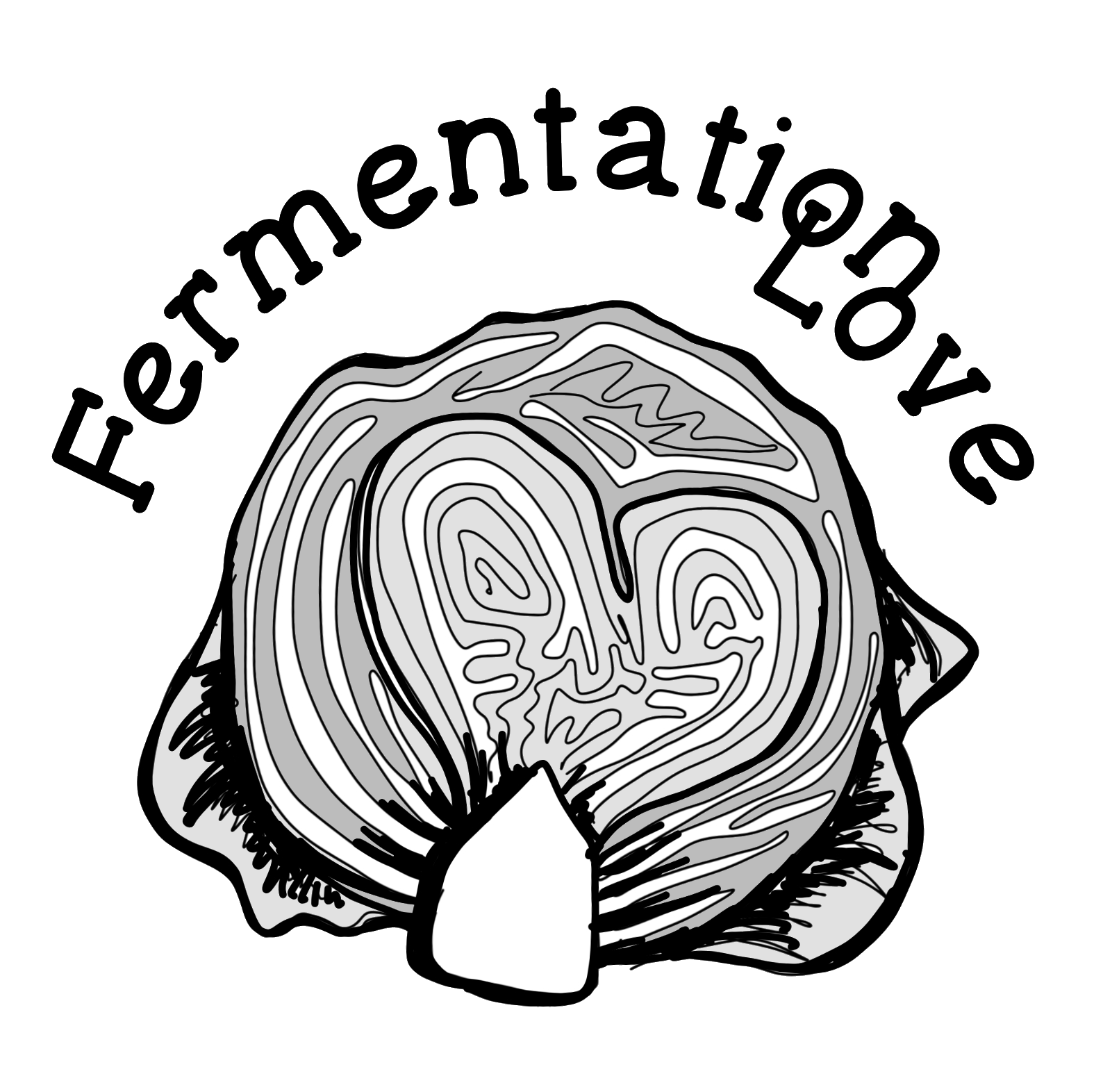
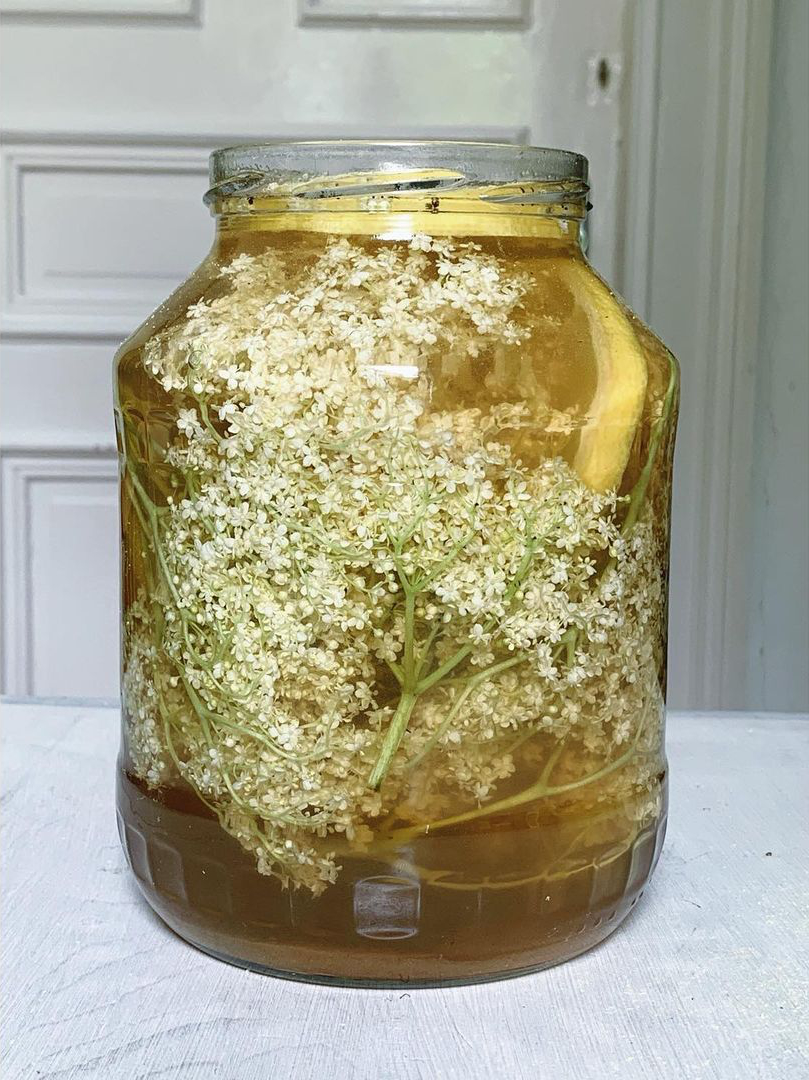
Hallo Katsu,
Ich habe vor paar Tagen deinen Blog entdeckt und habe schon zwei Sachen angesetzt. Bin grade mal wieder im Fermentationsrausch. Es macht wirklich Spaß.
Vielen Dank für den tollen Blog und liebe Grüße aus Berlin.
Nicole
Liebe Nicole,
vielen Dank für das Kompliment. Wenn ich Teil des Fermentierrausches bin, läuft ja alles, wie es soll 😀
Fröhliches Fermentieren weiterhin,
Katsu
[…] aktuell noch sehr viel in frischer weißer Form zu finden sind, gesammelt und damit einen Holundersekt angesetzt. Falls der Holunder auch bei dir noch nicht überall verblüht ist, findest du hier eine […]
Liebe Katsu,
erstmal herzlichen Dank für all die tollen Rezept die du ausprobierst und teilst! Mega! Hab auch schon einiges mit Erfolg und freude “nachgemacht”.
Der Holundersekt hat mich gleich begeistert und ich hab fleissig gesammelt und angesetzt. Allerdings mit Honig. Jetzt hab ich den Ansatz stehen gelassen und nach 2 Tagen abgeseiht aber es hat sich noch keine nennenswerte Menge Kohlensäure gebildet. Auch nicht in den Flaschen die schon 2 Tage an der Wärme stehen. Hast du eine Idee oder einen Tipp?
Herzliche Grüsse,
Bettina
Hej Bettina,
ungewöhnlich, aber nicht falsch. Je nachdem, wie viele aktive wilde Hefen auf den Blüten waren, geht es manchmal doch ein bisschen langsamer. Beobachte die Flaschen weiterhin, damit du die einsetzende Fermentation mitbekommst und sie nicht bersten. Manchmal kann es auch bis zu einer Woche dauern, bis sich nennenswert Kohlensäure bildet.
Gutes Gelingen,
Katsu
Hallo Katsu,
ich bin gerade auch bei Tag 2, habe gerade den Ansatz abgefüllt, habe aber noch keine CO2 Entwicklung bemerkt. Was mache ich denn, wenn es morgen in den Flaschen noch nicht sprudelt? Lüfte ich trotzdem oder warte ich die Kohlensäurebildung erst ab? Stelle ich die Flaschen auch erst dann in den Keller? Und dann ist das Lüften aber vorbei, oder? Habe nämlich in dem ein oder anderen Rezept von dir gesehen, dass du auch deine Flaschen im Kühlschrank regelmäßig lüftest.
Lieben Gruß
Xenia
Hej Xenia,
manchmal dauert es ein bisschen länger. Vielleicht waren weniger wilde Hefen auf deinen Blüten. Ich empfehle trotzdem das tägliche Überprüfen des Drucks, damit kein Unglück geschieht und die Flasche birst.
Benutze unbedingt Flaschen, die für Druckentwicklung geeignet sind, und bedecke sie auch in ihrem Lager im Keller. Auch beim Öffnen nach der Lagerung gib bitte acht und halte die Öffnung von dir weg gerichtet. Ich kühle das Getränk vor dem Öffnen.
Holundersekt ist ein fabelhaftes Gebräu, ich hoffe, du geniesst es.
Gutes Gelingen!
Katsu
Hi Katsu,
danke für die schnelle Antwort!
Ich benutze alte Bierflaschen mit Bügelverschluss von meinem Opa, der darin jedes Jahr erfolgreich Holundersekt gemacht hat. Leider hat er den Winter nicht überlebt…
Druck überprüfen heißt? Kurz lüften? Schütteln? Das ist mir noch nicht so ganz klar. Und im Warmen stehen lassen bis die Gärung einsetzt?
Ich habe viele Fragen, es ist mein erstes Mal 🤭
Alles Liebe und vielen Dank für deine Unterstützung!
Hej Xenia,
die Flaschen klingen vielversprechend. Zum Druck überprüfen halte ich den Deckel fest, während ich den Bügel vorsichtig löse. Man merkt dann recht schnell, ob sich schon Kohlensäure gebildet hat. Wenn noch kein Druck spürbar ist, öffne ich den Deckel nicht, sondern schliesse den Bügel schnell wieder, damit möglichst wenig Sauerstoff in die Flasche gelangt. Es ist tatsächlich eine Sache der Erfahrung, du wirst es bald herausgefunden haben.
Ich muss trotzdem immer wieder nachdrücklich warnen, weil es Berichte über schmerzhafte Unfälle wegen berstender Flaschen gibt. Fermentierte Getränke sind für Fortgeschrittene und, wie alles selbst gemachte, auf eigene Verantwortung.
Gutes Gelingen!
Katsu
Ich habe gerade eine Flasche getestet und ein bissl gezischt hat sie schon. Aber ich denke, sie brauchen noch eine Weile.
Danke für deine vielen Tipps. Ich habe die Flaschen aufrecht in einem Bierkasten und mit einem Tuch bedeckt, so dass hoffentlich keine großen Schäden entstehen können, selbst wenn etwas platzt.
Es ist auch nicht meine erste Fermentation. Ich backe meine Brot selbst mit Sauerteig und Hefewasser. Die Hefewasser-Züchtung ist ja ähnlich der Gärung des Holundersekts. Aber dein Vorgehen ist doch ein etwas anderes als in vielen anderen Rezepten. Zum Beispiel hätte ich bei der ersten Gärung darauf gewartet, dass CO2 entsteht und dann erst abgefüllt. Aber wenn die Limonade dann muffig schmeckt, bah! Also danke für den Tipp, ich bin sicher es wird köstlich! 🍾
Hi Katsu,
ich melde mich nochmal mit einem Update:
Meine Flaschen gären jetzt seit 4 Tagen in der Flasche im Warmen. Es hat sich Kohlensäure gebildet, aber noch lange nicht so viel wie ich gerne hätte. Wir haben gestern eine Flasche probiert und es prickelt nur leicht. Kein Vergleich mit deinem Video! Sollte ich die Flaschen also lieber noch stehen lassen bis sie die Menge an Sprudel haben, die ich möchte? Oder geschieht die restliche Reifung erst im Keller im Kalten? Ich hab Sorge, dass in der Kälte zu wenig passiert.
Lieben Gruß nach Hamburg!
Xenia
Hej Xenia,
auch im Kühlen geht die Gärung weiter. Fermente sind Slow Food – warte am besten ab, das wird schon.
Katsu
Hallo nochmal,
jetzt ist mir noch etwas eigenartiges aufgefallen. Und zwar ist die Limonade in den Flaschen etwas dickflüssig geworden. Sind das Pediokokken? Und wenn ja, ist der Holundersekt dann für die Tonne?
Hej Xenia,
möglich, Pediokokken oder Dextran oder etwas ähnliches, L. mesenteroides basierend liegt nahe. Beantworten kann ich das selbstverständlich nicht ohne es zu sehen, riechen, schmecken, mikroskopieren…
Warte ab, wie es sich entwickelt. Häufig ist die Phase temporär.
Viel Erfolg und Geduld,
Katsu
Geruch, Geschmack und Mundgefühl sind nicht verändert, nur optisch sieht es aus wie Sirup anstatt Sekt. Und dass meinem Empfinden nach die Co2-Bildung gehemmt ist.
Aber ich werde die Flaschen jetzt in den Keller stellen, erstmal nicht mehr anrühren und hoffen, dass es vorübergehend ist 🙏
Hi Katsu,
jetzt sind viele Monate vergangen, doch leider ist der Holundersekt kaum kohlensäurehaltig und immer noch optisch dickflüssig. Ist es besser, den Ansatz zu entsorgen?
Liebe Grüße!
Hej Xenia,
das klingt so, als sei etwas schiefgegangen. Ich würde ihn wahrscheinlich probieren und dann entscheiden, erst mit Nase und danach eventuell mit dem Mund. Bist du genau nach Rezept vorgegangen? Wenn du magst, schreibe etwas zu deiner Vorgehensweise, dann können wir herausfinden, warum das Ferment so geworden ist.
Viele Grüße, Katsu
Hi Katsu,
Geschmack und Geruch sind in Ordnung, nur könnte es spritziger sein. Und optisch…naja.
Ich habe mich an dein Rezept gehalten. Das Einzige, was es evtl. sein könnte, dass ich weniger Holunderblüten hatte, als angegeben, dafür aber sehr große.
Was meinst du dazu?
Sind die Flaschen richtig dicht?
So weit ich das beurteilen kann, ja. Das ein oder andere Gummi am Bügelverschluss könnte mal erneuert werden, aber ich habe bisher keinen Unterschied bemerkt. Ob altes Gummi, neues Gummi, der Inhalt war der gleiche.
Dann war nicht genug wilde Hefe vorhanden. Die Blüten müssen frisch und ungewaschen sein und in voller Blüte gesammelt werden.
Moin Katsu,
wir haben keinen Keller, wir kalt muss es den zur längeren Lagerung sein?
Gruß
Gabriele
Hej Gabriele,
wenn du Platz im Kühlschrank hast, geht das auch. Bitte achte dann darauf, dass die Flaschen aufrecht stehen und gut geschützt sind. Unter 13°C ist ideal.
Gutes Gelingen!
Katsu
Sehr gut erklärt und daher gut selbst machbar. Danke!
Eine Frage habe ich allerdings: muss ich meine Bügelverschlussflaschen nach dem Abfüllen wirklich noch einmal öffnen, oder kann ich diese auch geschlossen lassen (mit Ausnahme einer Probe vielleicht)?
Hej Esther,
ich kann es nicht verantworten, etwas anderes zu empfehlen. Was du dann machst, und ob dir eine Stichprobe reicht, merke ich ja nicht 😉
Danke übrigens, dass du die Anleitung so gelungen findest, das freut mich voll!
Gutes Gelingen,
Katsu
Und hier kommt die Rückmeldung zum Ergebnis, Katsu.
Ich habe brav den besten Ehemann von allen die Flaschen alle öffnen und wieder schliessen lassen und gestern eine zeitige Kostprobe riskiert.
Es hat ordentlich fizz und schmeckt genial.
Jetzt muss ich sehen, was das Feld und der Garten dieses Jahr noch bringen und dann probiere ich mich weiter durch Deine Rezepte!
Oh, wie schön! Genieß es.
Danke für die schnelle Antwort. Ich werde also alles brav öffnen um grössere Putzaktionen zu vermeiden.
Interessanterweise haben sich bei 2 Flaschen schon viel kleine Bläschen gebildet, während sich beim Rest noch nichts tut (beide sind form- und mengenmässig anders als der Rest aka mehr Inhalt).
Mal sehen, wie das weitergeht.
Und ich wiederhole nochmal mein Kompliment, diesmal für Deine gesamte Seite: hervorragend informativ was Du da ins Netz gestellt hast!
Ich fermentiere ja selbst viel (Bier, Sauerkraut, Brot), aber was Du hier bringst ist für mich oft Neuland und ich plane da viel zu probieren. Wie gut, daß der Acker gross ist bei mir und die Ernte hoffentlich auch.
Liebe Katsu,
wie lange wuerdest du denn den Hollundersekt fuer den optimalen Geschmack und Alkoholgehalt noch weiter fermentieren? 🙂
Vielen Dank schon mal fuer die Antwort! 🙂
Hej Li,
das ist total individuell. Ich mag ihn gerne gegen Ende des Jahres, also jetzt.
Probiere am besten jeden Monat eine Flasche, um herauszufinden, wann er dir am besten schmeckt.
Wohl bekomm’s!
Katsu